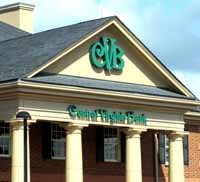 A local bank is taking advantage of a new federal law to save time, money and mountains of burdensome paperwork.
A local bank is taking advantage of a new federal law to save time, money and mountains of burdensome paperwork.
The parent of Central Virginia Bank said this week that it would delist its stock from the Nasdaq exchange and unregister from the reporting requirements of the Securities and Exchange Commission.
CVB chief executive Herb Marth said the decision was prompted by the Jumpstart Our Business Startups (JOBS) Act, which raises the threshold that requires banks to register with the SEC from 500 stockholders to 2,000.
With about 750 shareholders, CVB bit.
“The primary driver was cost savings, which will improve profitability and thereby our capital,” Marth said.
The move will save the bank at least $100,000 a year, he said. Those savings will come via reduced reporting and paperwork requirements. That means no more lengthy 10-Ks and 8-Ks and all the man-hours and auditor fees that come with them.
CVB will also relieve itself of the tentacles of the Sarbanes-Oxley Act, a law passed in 2002 to protect shareholders in the wake of the Enron and WorldCom scandals.
Executives of community banks have griped for years that the Sarbanes-Oxley Act was overly burdensome on smaller public companies.
This provision of the JOBS Act “is a smart move on the part of our government,” Marth said.
CVB has plenty of motivation to find cash wherever it can.
After losing a combined $33 million between 2008 and 2010, CVB was light on capital and in hot water with regulators. It suffered losses on investments in Lehman Brothers, Fannie Mae and Freddie Mac, as well as on soured commercial real estate and business loans.
CVB attempted to raise $15 million in late 2010 but postponed the effort soon after.
The bank hasn’t raised capital since it received $11.3 million from the U.S. Treasury in January 2009 through the TARP Capital Purchase Program.
The bank also entered into a written agreement with regulators in June 2010. That agreement requires the bank to reach the “well capitalized” threshold.
It was considered only “adequately capitalized” according to regulatory standards at the end of 2011.
 Marth joined the company as a turnaround specialist in 2010. He was named chief executive in January 2011, replacing longtime CVB head Larry Lyons.
Marth joined the company as a turnaround specialist in 2010. He was named chief executive in January 2011, replacing longtime CVB head Larry Lyons.
CVB’s $778,000 profit in 2011 was its first in three years.
Despite delisting from Nasdaq, CVB will continue to be publicly traded on the over-the-counter markets and hopes to retain its long-held trading symbol: CVBK.
Nasdaq had already warned CVB that it could be delisted if its stock price didn’t hit $1 per share.
The bank’s stock has languished near $1 for much of the past year. It bottomed out at $0.38 per share in December. It closed Thursday at $0.84 per share.
CVB might be the first of many small banks across the country to act on this provision of the JOBS Act.
At least one Virginia bank is following suit.
Bank of Botetourt, which operates around Roanoke, said Thursday that it would terminate its duty to file SEC reports.
To provide at least some transparency going forward, CVB will still have to file call reports with the FDIC and will file abbreviated proxies.
Richmond-based Peoples Bank of Virginia is also a non-reporting bank — its shares are traded over-the-counter — but it is on the verge of being acquired by a larger public bank.
Marth said the move does not immediately help or hurt CVB’s ability to raise capital.
He said the bank still has its eyes open for a capital raising deal.
“I wish there was more to report there,” he said. “The markets are just not open to capital raises for under capitalized banks.”
 A local bank is taking advantage of a new federal law to save time, money and mountains of burdensome paperwork.
A local bank is taking advantage of a new federal law to save time, money and mountains of burdensome paperwork.
The parent of Central Virginia Bank said this week that it would delist its stock from the Nasdaq exchange and unregister from the reporting requirements of the Securities and Exchange Commission.
CVB chief executive Herb Marth said the decision was prompted by the Jumpstart Our Business Startups (JOBS) Act, which raises the threshold that requires banks to register with the SEC from 500 stockholders to 2,000.
With about 750 shareholders, CVB bit.
“The primary driver was cost savings, which will improve profitability and thereby our capital,” Marth said.
The move will save the bank at least $100,000 a year, he said. Those savings will come via reduced reporting and paperwork requirements. That means no more lengthy 10-Ks and 8-Ks and all the man-hours and auditor fees that come with them.
CVB will also relieve itself of the tentacles of the Sarbanes-Oxley Act, a law passed in 2002 to protect shareholders in the wake of the Enron and WorldCom scandals.
Executives of community banks have griped for years that the Sarbanes-Oxley Act was overly burdensome on smaller public companies.
This provision of the JOBS Act “is a smart move on the part of our government,” Marth said.
CVB has plenty of motivation to find cash wherever it can.
After losing a combined $33 million between 2008 and 2010, CVB was light on capital and in hot water with regulators. It suffered losses on investments in Lehman Brothers, Fannie Mae and Freddie Mac, as well as on soured commercial real estate and business loans.
CVB attempted to raise $15 million in late 2010 but postponed the effort soon after.
The bank hasn’t raised capital since it received $11.3 million from the U.S. Treasury in January 2009 through the TARP Capital Purchase Program.
The bank also entered into a written agreement with regulators in June 2010. That agreement requires the bank to reach the “well capitalized” threshold.
It was considered only “adequately capitalized” according to regulatory standards at the end of 2011.
 Marth joined the company as a turnaround specialist in 2010. He was named chief executive in January 2011, replacing longtime CVB head Larry Lyons.
Marth joined the company as a turnaround specialist in 2010. He was named chief executive in January 2011, replacing longtime CVB head Larry Lyons.
CVB’s $778,000 profit in 2011 was its first in three years.
Despite delisting from Nasdaq, CVB will continue to be publicly traded on the over-the-counter markets and hopes to retain its long-held trading symbol: CVBK.
Nasdaq had already warned CVB that it could be delisted if its stock price didn’t hit $1 per share.
The bank’s stock has languished near $1 for much of the past year. It bottomed out at $0.38 per share in December. It closed Thursday at $0.84 per share.
CVB might be the first of many small banks across the country to act on this provision of the JOBS Act.
At least one Virginia bank is following suit.
Bank of Botetourt, which operates around Roanoke, said Thursday that it would terminate its duty to file SEC reports.
To provide at least some transparency going forward, CVB will still have to file call reports with the FDIC and will file abbreviated proxies.
Richmond-based Peoples Bank of Virginia is also a non-reporting bank — its shares are traded over-the-counter — but it is on the verge of being acquired by a larger public bank.
Marth said the move does not immediately help or hurt CVB’s ability to raise capital.
He said the bank still has its eyes open for a capital raising deal.
“I wish there was more to report there,” he said. “The markets are just not open to capital raises for under capitalized banks.”
I can understand the desire of the bank to have less regulation, but I hope that enough information is still provided to shareholders to help them make informed investment decisions. If not it will definatly impact the ability to rase new capital.
All bank records can be accessed through their UPBR reports found on the FDIC website. There is no shortage of information on these reports. I am a bit confused as to how this move nullifies the executives SOX requirements. This is still applicable to public companies